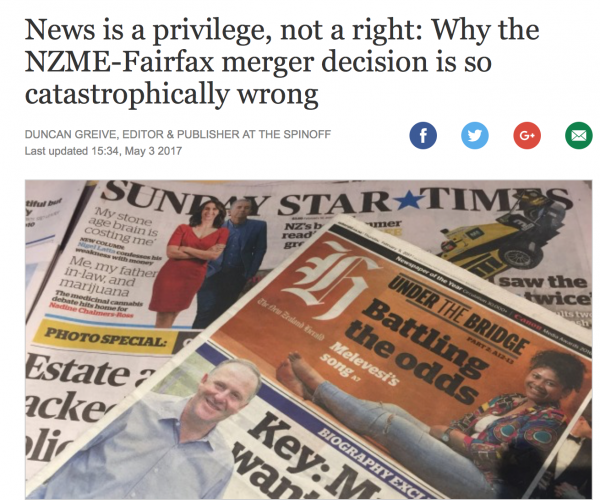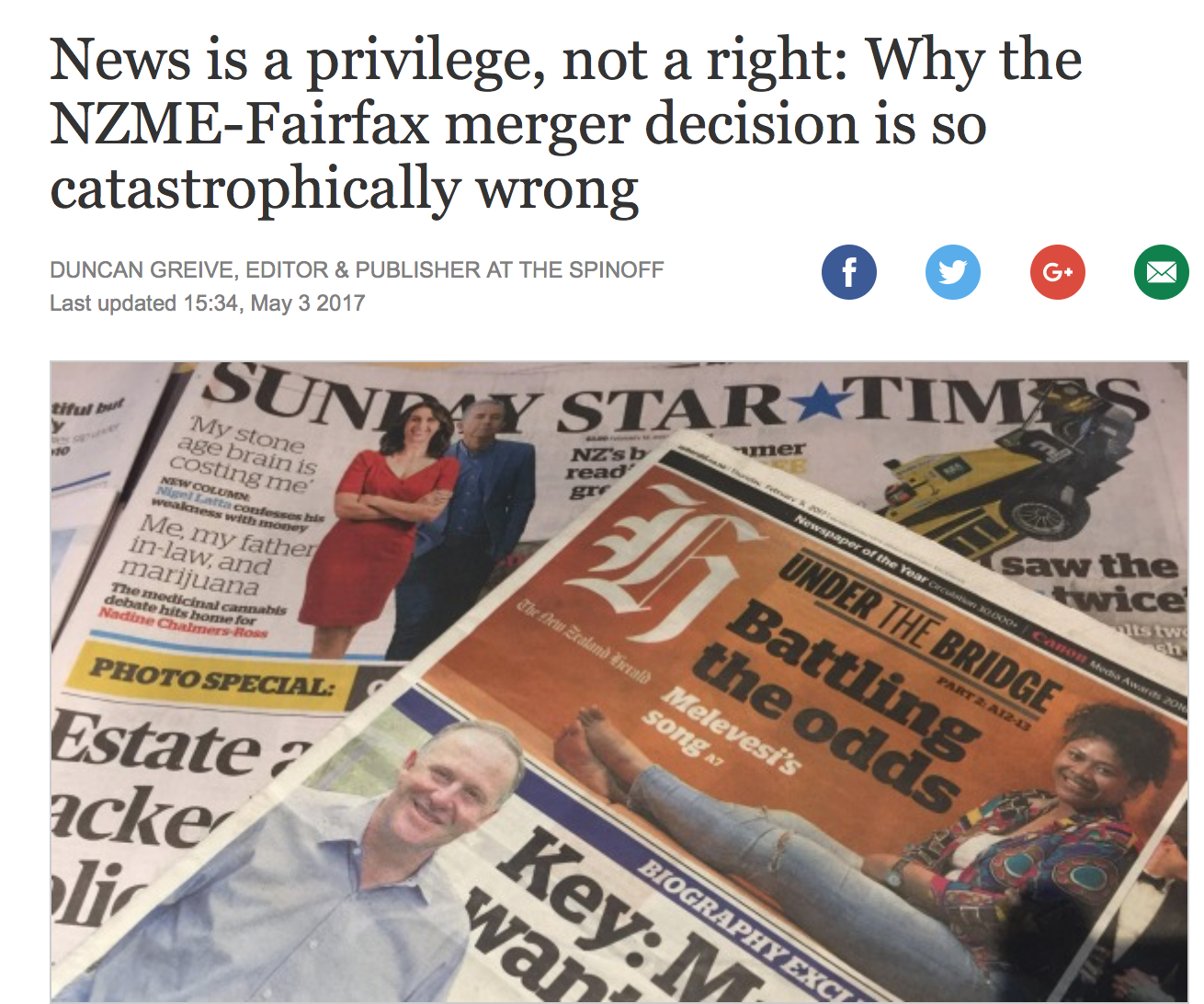
Under a NZME-Fairfax merger one media conglomerate would wield unassailable national power.
Economically, they would control half of the commercial radio market, nearly 90 per cent of daily newspaper circulation and most on-line traffic to on-line sources of New Zealand news.
Politically, substantial control over the national news agenda would reduce the range of viewpoints available on major public issues. In the daily press it would be quite easy to run a single editorial line in the lead up to an election or during the formation of a new government.
The possible media concentration levels and the political ramifications described here typify authoritarian regimes rather than liberal democracies.
The Commerce Commission blocked the proposed NZME-Fairfax merger largely on these grounds.
Their Executive Summary states that a merged entity would have `the scope to control a large share of the news consumed by a majority of New Zealanders`.
This eventuality, it says `creates a real risk of harm to New Zealand`s democracy and the new Zealand public`.
Predictably, opposition to the Commerce Commission`s decision came from Fairfax and NZME; their own submissions had argued strenuously for a merger go-ahead. Accordingly, the New Zealand Herald`s May 5 editorial was entitled `Blocking this merger is a big mistake.`
I expected a more considered argument from an on-line magazine which is said to employ `some of New Zealand`s best non-fiction writers to create smart, shareable content`.
Let’s start with the title of this piece- `News is a privilege not a right: why the MZME-Fairfax merger decision is so catastrophically wrong`.
Now if `news` as a form of information is, in fact, a `privilege` then it can`t be universally available.
It belongs to some people but not to others.
From this perspective, the news media cannot have a democratic function because it doesn`t produce public information.
In the article Grieve claims not to be against the public good argument but maintains that ` in the commercial world [news] will only be made so long as it can consistently turn a profit`.
He claims that the Commerce Commission has erred catastrophically by not understanding this.
There are two related misunderstandings here. Firstly, the Commerce Commission is not required to evaluate the commercial pressures on news production, its purpose is to assess restrictions of competition within and across media domains.
Secondly, if the preceding observation is correct then the Commerce Commission should not be held culpable for the financial and commercial difficulties of media corporations.
Like all opponents of the merger Greive argues (correctly) that Google and Facebook are drawing advertising dollars away from mass media organizations ,especially newspapers and magazines. Once again, however, the Commerce Commission cannot be blamed for not addressing the trend, it is not in their legal remit to do so.
In my view a separate internationally supported initiative is required to tax and regulate the social media behemoths.
Greive`s understanding of the relationship between news journalism and the commercial reality of media corporations is misconstrued.
He declares that `job losses are inevitable and will in my opinion be far larger and more destabilising than had they happened in a controlled style in a merged entity`. In fact major job losses in New Zealand and Australia have already occurred within APN News and Media, NZME and Fairfax.
Newsrooms have been hollowed out or dismantled as remaining journalists are expected to produce stories across multiple platforms. A merged entity would have expedited this process as news gathering and news became further rationalised.
The provincial press would have been in grave danger under a merged entity as indeed it still is.
Anyone who doubts this analysis should read, free on the web, the last five New Zealand media ownership reports produced by the (JMAD) research centre which I co-direct. (Journalism Media and Democracy).
These reports, authored by Merja Myllylaht, also detail a major shift in the commercial reality of New Zealand media corporations (including Fairfax, APN News and Media and NZME).
In short, listed and unlisted financial organisations have become dominant shareholders. From 2010 to 2012 within APN News and Media (NZ) financial institutions increased their control over total shareholdings from 22.6 to 55.6 per cent.
Over the same period Fairfax`s Trade me was divested to financial institutions.
In 2012 they held 56.5 of Fairfax`s shares.
From 2014 to 2016 all of New Zealand`s largest media companies (including Sky and Media Works) were predominantly owned by financial institutions.
This kind of media ownership is systematically destroying journalistic and newsroom culture.
Finance capitalists see media companies merely as business units rather than as structured media wholes. Short term profit rates are paramount, long term planning is an unaffordable luxury.
The critical point here is that Fairfax and NZME are still profitable, they have problems but they are not basket cases. Financial owners however are fixated on the rate of profit rather than general profitability. So, while it is true that Fairfax and NZME are adversely affected by the growth of digital news consumption and the migration of advertising spend to social media that is only part of the story.
Greive ignores the fact that financial institutions have imposed their own commercial reality onto news media organisations. Needless to say, none of this is the fault of the Commerce Commission.
I rest my case.






If you mentally renamed The Spinoff as the Spin Meisters then it puts their corporate bootlicking mentality into perspective.
Yes Wayn,
The Elitist culture want to wield total power over us all with the culture they cherish inside their padded secret boardrooms as they are plotting against us all and next will be the “robot takeover next, so they want us exterminated for sure judged by reading this.
The Robot Economy: Ready or Not, Here It Comes
Sunday, May 07, 2017 By JP Sottile, Truthout | News Analysis
Excerpt
September 17th changed everything.
On that day in 2013, Oxford University published an innocuously titled academic paper by two mostly unknown economists. But “The Future of Employment” wasn’t just another number-crunching exercise in opacity by a couple of dreary scientists.
No, their bombshell report portended a coming robot apocalypse that could change the nature of human civilization, and perhaps even human beings themselves.
http://www.truth-out.org/news/item/40495-the-robot-economy-ready-or-not-here-it-comes
“Greive ignores the fact that financial institutions have imposed their own commercial reality onto news media organisations. Needless to say, none of this is the fault of the Commerce Commission.
I rest my case.”
Yes, you are absolutely right, Wayne, Duncan Greive is nothing but an apologist for the end result of ruthless capitalism, seeking nothing but profit maximisation.
Sadly people like he have grown up in times, where the MSM and as a consequence also democracy have already been so corrupted, they cannot even see the flaws in the system we have.
Considering information as being a “privilege” is absurd, so does he believe in everything and everybody being nothing but a commodity or “product” that is there for sale?
This view leads to ever more elitism and exclusion of wider parts of the population from necessary information, without which it is impossible to participate in a functioning democracy.
And allowing ever more concentration within the media, that will in itself destroy the remnants of democracy we may still have.
So when will he and the rest at the Spinoff start using a paywall, I wonder? Is that what is to come?
Absolutely. And as a little old grey haired lady, I’m trying to get my head around this right wing global ownership of news media, polling companies and political controllers like Cambridge Analytica. Can someone direct me to some succinct reading material?
Here is just some essential reading and study material, sadly most out there have little or NO clue about what is going on:
https://cambridgeanalytica.org/
https://en.wikipedia.org/wiki/Cambridge_Analytica
https://www.theguardian.com/technology/2017/may/07/the-great-british-brexit-robbery-hijacked-democracy
https://www.theguardian.com/australia-news/2017/apr/05/donald-trumps-data-mining-advisers-to-meet-liberal-mps-in-canberra
https://motherboard.vice.com/en_us/article/how-our-likes-helped-trump-win
Grieve: “But, but, but muh union officials!”
So banks, etc clearly saw the media as a way if enhancing profits. And to do that it is important they manipulate the “news” to best suit their goals.
They can continue to feed the news, as they do with property investment porn to sell more banking products. They can slant their media outlets to the political partys that best fulfil their wants. National and Mike Hosking ring a bell anyone?
Capitalism is really destroying itself because unbridled pure self interest over the greater good will do that.
Banks should NOT by law be able to get anywhere near anything that influences information and opinion. Nor should monopoly/duopoly Murdoch type organisations.
And public broadcasting independent of shareholders must be given paramount importance for anything resembling a functioning democracy.
I read Grieves’ piece in The Press in which it got a half page spread in the Business section. There were two other articles relating to the merger apparently to make the “news is a profit” piece balanced. They read like the authors had been forced to put the other side of the argument together and hence were as interesting to read as Colin Craigs autobiography would be.
2003.
WMD and Iraq.
The day the media died.
Correct Wayne – it’s not the role of the Commerce Commission to ensure that unearned income is delivered to the shareholders of media companies.
When Grieve says “in the commercial world [news] will only be made so long as it can consistently turn a profit” he should probably say “sufficient profit”. Because it may be possible to run these organisations profitably but not with the margins that deliver the desired amounts of unearned income to shareholders.
And in any case, if news cannot be made in the commercial world it will need to be made elsewhere. Removing the commercial imperative may give us a better product – time to explore post-capitalist methods for keeping people informed.
The po;iical and business acumen the spinoff touts is wondrous.
Did they not support bill ralston in some election derby?
Comments are closed.